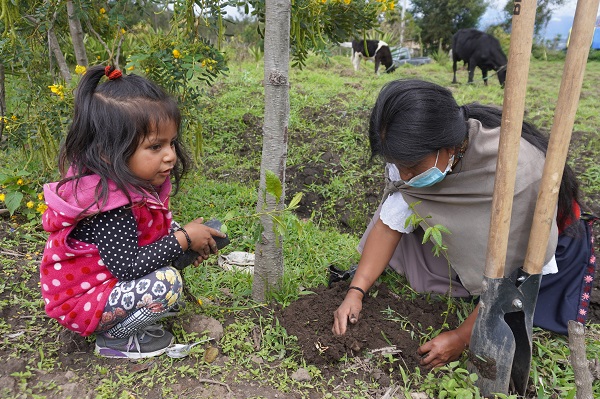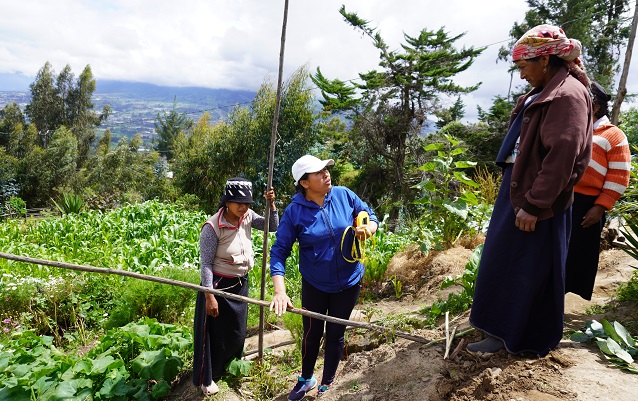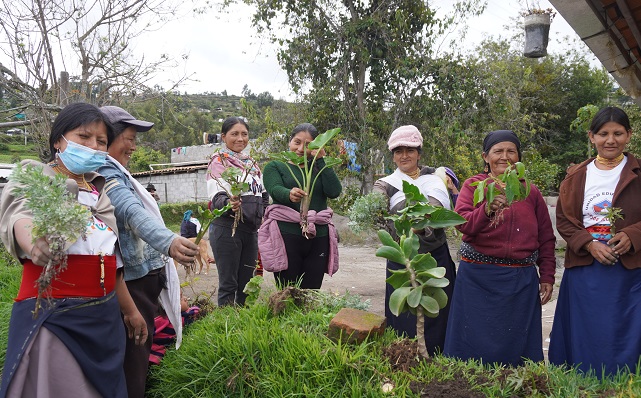Increasing food sovereignty and climate resilience by agroecology for small farmers in the Ecuadorian Highlands

The Ecuadorian Sierra and its agricultural production are heavily impacted by alteration of rainfalls due to the accelerating climate change. The IKI Small Grants project takes place in an indigenous community at the Eastern hillside of volcano Cotacachi, where people having only limited access to land and none to irrigation. It aims to develop community-based water harvesting techniques and agroecological concepts to adapt to the alteration of rainfalls due to climate change in the region. It also capacitates 10 women promoters who will act as multipliers contributing to the development of community knowledge regarding water harvesting and agroecology and implementing model farms on their sites. The generated knowledge serves as a basis for an online learning course about adaption to change for small farmers. Additionally, a forum with farmers, social organisations, local public servants, and political representatives aims to disseminate the results.
INITIAL SITUATION
The project region is located in El Cercado, where the Kichwa community lives on the Eastern hillside of volcano Cotacachi at an altitude of 2500-2715 m. Water provision only nearly covers household necessities, without enough provision for irrigation. Agricultural production therefore solely depends on rainy seasons. Due to climate change the rainy seasons have become increasingly unpredictable. Production losses have become more regular, for instance due to dry periods even during the rainy seasons, or due to heavy rainfalls. Deforestation and soil degradation further contribute to water scarceness.
TARGET GROUP
The project targets local farmers (mainly women) and their families from which a subgroup is chosen in a participatory process as promoters. The group will participate in capacity building activities and implement water harvest infrastructure on their sites. Additionally, they will develop model farms, which serves the farmers to farmers-learning methodology. The selected participants promote their knowledge in their own community. The online course and the forum target leaders of regional, and national social organisations, students and state servants.
APPROACH AND ACTIVITIES
The project aims to develop capacities on economically available and site adapted, indigenous and community-based techniques on water harvesting and agroecology. The aim is to mitigate the effects of rainfall alterations (due to climate change) on agricultural production of small indigenous farmers. Besides, the project seeks to produce healthy food in areas without irrigation systems.
The project improves capacities on different levels: At the community level, the project implements model farms and teaching systems and capacitates chosen promoters in the indigenous community of El Cercado. The project fosters the active role of women, their know-how and communication skills to improve their standing in communities with a very traditional role distribution between men and women.
The model farms generate concrete experiences and data on how water harvest and agroecology measures can provide sufficient water supply in areas with alterations of rainfall. The experiences contribute to the development of community knowledge about water harvest and agroecology and are integrated into the first online-learning course about this topic in Ecuador. The course teaches the technical knowledge in a practical way. A second objective is to promote a rights-based approach regarding adaptation to climate change in the local political context.
The project further organizes an event with local farmers, with a focus on women, social organisations, local public servants and political representatives to disseminate the topic and results, exchange experiences and to disseminate and exchange about viable local solutions for adaption to climate change, and aims to promote the rights on food, land and water and the necessity to adapt politics to local needs.
LATEST PROJECT HIGHLIGHTS AND IMPACTS
- Project finalized.
- A virtual classroom was developed on “Climate change, agroecology and water harvesting” featuring interactive videos, assignments and quizzes, which can be found here.
- At the local level, a forum on Agroecology and Climate Change was held. 80 people, including 60 women participated. Talks were given by academics, technicians from public institutions, NGOs, students and women from the community of El Cercado.
- 11 female promoters from the community of El Cercado were trained in water harvesting technologies and soil protection practices.
CAPACITY DEVELOPMENT
IKI Small Grants supports SEDAL Ecuador in their organisational capacity development through advanced trainings in:
- Technical knowledge regarding the calculation of carbon capture by converting conventional agricultural systems in agroecological ones
- Gender and climate change
- Data protection
ABOUT THE ORGANISATION
SEDAL is a non-profit organisation, established in 1999. It provides alternative environmental strategies that allow the preservation of ancestral knowledge about agriculture and environment. Services include the study of agroecological processes to support the fight against rural poverty and to recover scarce recourses of indigenous families. SEDAL also provides capacity development of organizations, women groups, and the transformation of experiences of social and institutional actors into policy proposals to local governments.


